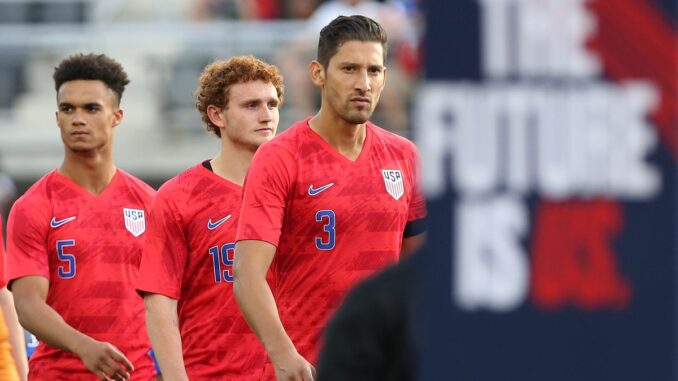
The easy answer is no… or at least not yet. The failure of the full men’s national team to qualify for the 2018 World Cup led to some serious doubts about the program’s state, and a year-and-a-half into the team’s new look, questions remain about the strength of the team. Just this month, the U-23’s failed to qualify for the Olympics. It felt very reminiscent of three years ago and may make fans anxious about how strong this next class of players actually is.
While the USMNT’s best youth players could not be called in as the tournament leaked into the European calendar, 9 out of the 11 starters in every game were regular players for MLS teams. Compare that the two teams they lost to, Mexico and Honduras, where both squads were interlaced with youth players that were not full-time starters for their club teams or were plying their trade in weaker leagues. While I am reticent to come down too hard on the players as the whole point of a “youth” tournament is that the players are young, Head Coach Jason Kreis is more than deserving of that criticism. The team often looked sloppy and out of ideas, even against their opponents’ weakest, pointing to a lack of preparation in the game plan.
His appointment as head of the U-23s was made by US General Manager Ernie Stewart and Head Coach Gregg Berhalter, meaning that this failure also stretches. Berhalter, in particular, is under the gun this summer as after a year-plus in charge, the full National team has yet to come away with a signature win. The Pandemic has minimized those chances. With the US loss in the Gold Cup final to Mexico in 2019 being the only big game he has coached, this summer will open up many more opportunities. The Gold Cup and CONCACAF Nations league will return this summer, with the final round of World Cup qualifying set to begin in September. Match-Ups with Mexico and strengthened Jamaica and Canada squads will be the real indicator of Berhalter’s effectiveness in both tactics and roster construction.
For maybe the first time in a long time, the roster can officially be labeled as “stacked.” Christian Pulisic wears the no. 10 shirt for Chelsea, Weston Mckennie plays on the same pitch as Cristiano Ronaldo, and Sergino Dest was last photographed hugging Lionel Messi after scoring a goal. Other players include Valencia’s Yunus Musah, RB Salzburg’s Brendan Aaronson, Leipzig’s Tyler Adams, Werder Bremen’s Josh Sargent, and Wolfsburg’s John Brooks are all starter’s in quality European leagues and are good enough to propel this team to height’s not seen before. There is no excuse to lose this summer.
But the same could be said about the u23’s, which means Berhalter is the one that needs to steer them there. That mean’s more flexibility and a willingness to switch tactics mid-game. While Berhalter’s system has been a welcome sight for US fans after the chaotic days of the Jurgen Klinsmann, his biggest weakness is a commitment to it, even when it’s clear that it’s not working on the day. The aforementioned loss to Mexico in the Gold Cup is a clear example. After a very promising first half, the Mexico coach, Tata Martino, switched tactics that led directly to the goal that cost the Yanks the game. At the beginning of the match, Mexican star Rodolfo Pizarro was lined up across from American right-back Reggie Cannon. Using both his pace and defensive aptitude, Cannon greatly reduced Pizarro’s influence on the game and allowed the US to shut down Mexico. After the interim, though, Martino moved Pizarro to the opposite side of the field where the lead-footed Tim Ream played left-back. Without a defensive equal, Pizarro took over the game, Mexico scored, and that was that.
A similar issue cropped up in the US’ first match-up with Canada in the Nations League. Canada, knowing full well what the Americans were trying to do, set up in a shape that absorbed pressure and allowed them to counter-attack into the vulnerable points of the US defensive shape. Berhalter failed to adjust, leading to a 2-0 defeat and Canada’s first victory over the US in 35 years.
The upcoming summer fixtures will be full of these similar types of games, with teams more than good enough to take advantage of Berhalter’s weaknesses. The USA should be good enough to win any of its upcoming tournaments but has proven absolutely beatable for anyone that can get the jump on them. Whether Berhalter can show the flexibility required to overcome it will be both his biggest test and the team as a whole, as it looks to rebound from its failure in 2018.



